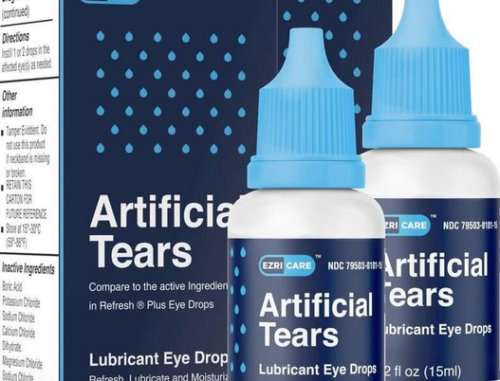Eye drop warning, Bambi’s revenge, vitamin D vs suicide, and more
03 Feb 2023
Posted by Andrew Kantor
Vitamin D cuts suicide risk
Way back in 2011, researchers thought they found a link between vitamin D levels and the risk of suicide. In 2014, other researchers also found that low levels of vitamin D ‘appears to be associated with’ suicide attempts.
Now Veterans Affairs researchers have found it works the the opposite way, too: People who take vitamin D supplements are less likely to try to hurt themselves. And they mean a lot less likely:
Overall, vitamin D3 use was linked to a 45% lower risk of suicide attempts and self-harm, and vitamin D2 was linked to a 48% lower risk.
That’s based on the records of more than 600,000 vets over eight years.) Based on this, they suggest that depression is a good reason to screen patients for low vitamin D.
Two notes: First, not surprisingly, the lower someone’s vitamin D level before supplements, the greater the effect. Second, the effect was greater with D3 than with D2.
Warning: The eyes shouldn’t have it
It’s not a recall, but the CDC is warning people not to use preservative-free EzriCare Artificial Tears. It seems that people using them have been infected with the drug-resistant Pseudomonas aeruginosa bacteria — and at least three were blinded in an eye and one person has died.

North Georgia OD cluster
The DPH is warning about what it thinks is a cluster of overdoses in Catoosa and Walker counties, including some that were fatal, from street drugs possibly laced with fentanyl.
It is critical that persons who use drugs understand there is a risk of overdose when using stimulants or other drugs that may be mixed with fentanyl or other synthetic opioids.
Covid’s killing kids
Covid-19 is now the eighth most common cause of death among people under 18 in the US. That’s kind of a big deal, because kids typically don’t die from any cause. It knocks flu and pneumonia down the list, meaning Covid now causes “substantially” more deaths than any vaccine-preventable disease, and is the most deadly respiratory disease.
The top seven: perinatal conditions, unintentional injuries (often gunshots), congenital malformations, assault (ditto), suicide, malignant neoplasms, and heart disease.
Don’t worry, be happy pharmacy workers!
For International Day of Happiness, GPhA is offering a free CPE webinar: From Work to Play.
Happy workers (including you!) are less stressed, more motivated, and generally more pleasant to be around. So From Work to Play will show you how to be that happy person using Positive Psychology and Positive Reinforcement.
It’s free — thanks to the Georgia Pharmacy Foundation’s PharmWell program — and it gives an hour of CPE credit.
Who’s the speaker? That’d be Theodore Rosen, PhD.
When’s it at? Live via Zoom, Monday, March 20 from 7:00 – 8:00 pm.
Click here for the details and to register!
(If, however, you choose to celebrate March 20 as National Alien Abduction Day, when you return you’ll be able to take the webinar on-demand. You just won’t be able to ask questions.)
Reservoir deer
Like the discount rack of DVDs in the back corner of Best Buy, all those old Covid variants haven’t disappeared — they’re just tucked away. Tucked away in white-tailed deer.
Scientists analyzing samples collected from white-tailed deer in New York state have identified the Alpha, Gamma, and Delta SARS-CoV-2 variants well after they caused widespread Covid-19 in people, representing a reservoir for the strains and a potential future risk to humans.
It’s not just New York, by the way — the viruses ware found in deer in six other states.
Antidepressants and pain
More and more, doctors are prescribing antidepressants for some kinds of chronic pain. It seems to work in some cases, but Aussie researchers caution that there’s not a lot of evidence that they work, and the evidence that does exist doesn’t jibe with common prescribing.
Meaning: Tricyclic antidepressants (e.g., amitriptyline) are the type most often prescribed for pain, but “but the review showed that it is unclear how well they work, or whether they work at all for most pain conditions.” In contrast, SSNIs like duloxetine seem to be the most effective.
They caution that prescribers shouldn’t be lumping all antidepressants together when it comes to treating pain, and that more research is needed to determine which work best.
Georgia opioid lawsuit resumes
There’s been lots of press about the Big Opioid Lawsuit (and various Big Opioid Settlements), but let’s not forget the smaller ones.
Here in Georgia, a Covid-delayed trial has resumed that pits families of people hurt by opioids against Cardinal Health, McKesson, and JM Smith Corp, which they say acted as illegal drug dealers — and Georgia law allows people to sue drug dealers.
[The plaintiffs’ attorney] said the distributors fueled illegal opioid use by filling illegitimate pharmacy orders and failing to report suspicious opioid purchases to law enforcement.
Not named are pharmacies or prescribers, though. “A pharmacy can’t fill a prescription if these distributors are not breaking the law, which they did over and over and over again.”
For their part, the distributors say they can’t be held responsible, as they were just following the orders.


